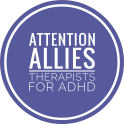Relational and integrative counsellor Cat Chappell argues that it’s not ADHDers that need fixing but a variety of aspects of society and its provisions that should alter to enable those with ADHD to thrive.
(5 minute read)
As more information and understanding of what ADHD is, and what it means to have it becomes available, we are increasingly able to understand how it shows up in people internally and externally, and (for some) that ADHD is part of who they are and what they may have been living with for years.
In tandem with this, I’ve noticed an increased supply of therapists, coaches, Instagram healers and mobile phone apps that offer therapies and “solutions” for ADHD.
I am glad there is so much more support for those with ADHD, but what I do worry about are the offers of support that claim and allegedly provide the “fixing” and “curing” of ADHD, as if it is a disease or condition to overcome.
I feel that ADHD is a neutral term – not a superpower, nor a hindrance that stops life happening (but, within that, I fully acknowledge how it can make life much more difficult – more on that later). For me, ADHD is a way that some human minds function. For some circumstances it can be useful. An example may include when working under pressure or with things that need an emergency response. Another example is using a novel approach and/or streamlining (getting something done quickly) with minimum effort.
For others, especially when faced with a generally neurotypical and capitalist approach to living and working, it can prove particularly tough and exhausting to navigate. A lot of that exhaustion comes from pushing through the painful task of engaging with something that provides no interest, and quite a bit can come from masking.
As a therapist and a human being I believe there should never be a “one-size fits all” approach to how to work with anyone – including those with ADHD – because we are all different, as people, as sets of experiences. We vary in how our brains work and what being a human in the world is like, the societal privileges you do and don’t have, and how those experiences have impacted, or continue to impact, on you as a person.
For those with ADHD there are many similarities, shared experiences and ways of being. Each has their own (what I would call) “flavour” of ADHD – especially those with dual diagnoses (e.g. Autism and ADHD). For example, some experience the hyperactivity externally in their physicality (and how they move will be different also), and for some the hyperactivity is internal, in the mind and thought. Some experience it in both and, for all, the “volume” of the hyperactivity varies from person to person and will change throughout time.
One sad commonality I do find for those with ADHD is shame – often given typically in work, education and family – especially when they are in neurotypical institutions and circles with little understanding or tolerance for those who are different.
The ADHD doesn’t need fixing – the system does. But in lieu of that, as a therapist, I aim to help “de-shame” the client from those previous and future experiences. One term I enjoy and use often is that of tasks being “morally neutral”. I first came across this term in the helpful (especially as it is brief) book called How to Keep House While Drowning by K.C. Davis. In it, Davis lists all care tasks as morally neutral – they need doing, but how they’re done is up to you. For example, we all need to eat – but how you get the food and what it consists of is morally neutral. It doesn’t matter if you cooked it all by scratch, or microwaved a meal or ordered takeaway: all of these options are morally neutral. The goal is to eat, and the point is making that happen. The shame comes from having to “do it right”, which is a combination of neurotypical thinking and internalised capitalism. Women can be subject to this further, as there is more judgement on how they keep their households, regardless of the others who live in it with them. So rather than a fix, allowing simple self-compassion and permission to do tasks in any form (or ditch those that aren’t vital), and do them in the easiest and most pain-free way, can be liberating for anyone, let alone someone with ADHD. Having financial privilege helps, as many experience what is known colloquially as “ADHD tax”. This is accumulated by paying for convenience, buying multiple items, missing returns windows, or replacing items that have been dropped or lost.
The only “fix” needed is that within society. Give more understanding and provision to those with ADHD from childhood through to adulthood, and you will see many more ADHDers thrive rather than drag themselves through society’s needless hoops in this “one-size-fits-only-the-really-privileged” way of being.
Click the links if you'd like to visit Cat's therapy website or her directory entry on Attention Allies.
Published 25 October 2024
All rights reserved © Copyright Cat Chappell 2024. Unauthorised use and/or duplication of this material without express and written permission from the author of this post is strictly prohibited. Author contact via website Contact page.
Website version and image © Copyright Attention Allies 2024.
